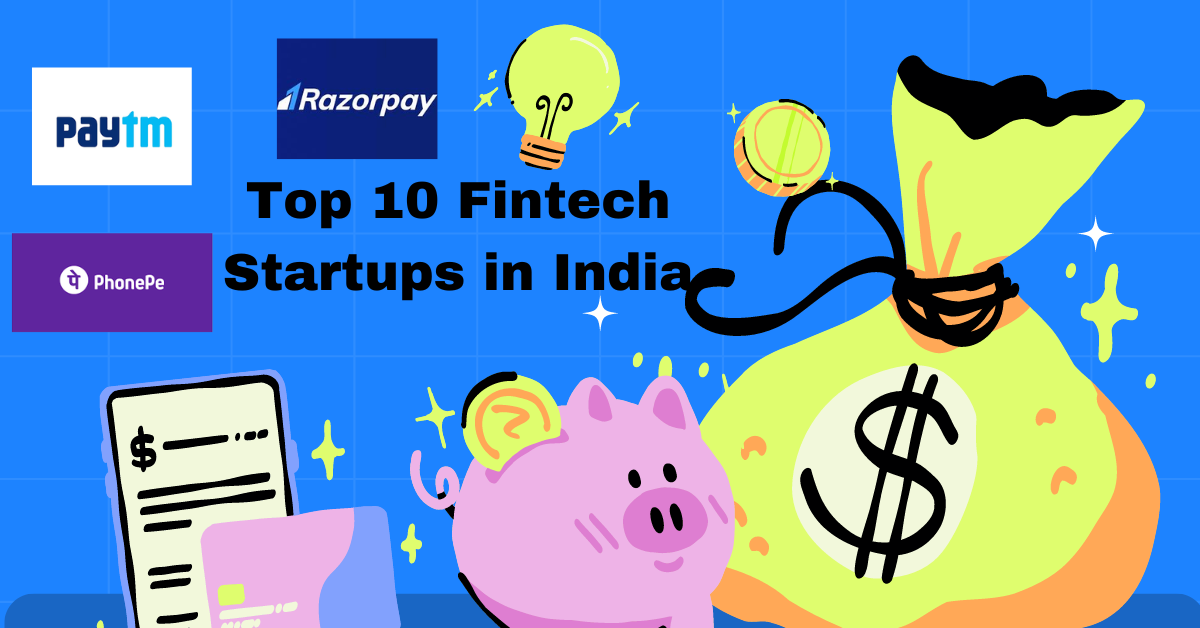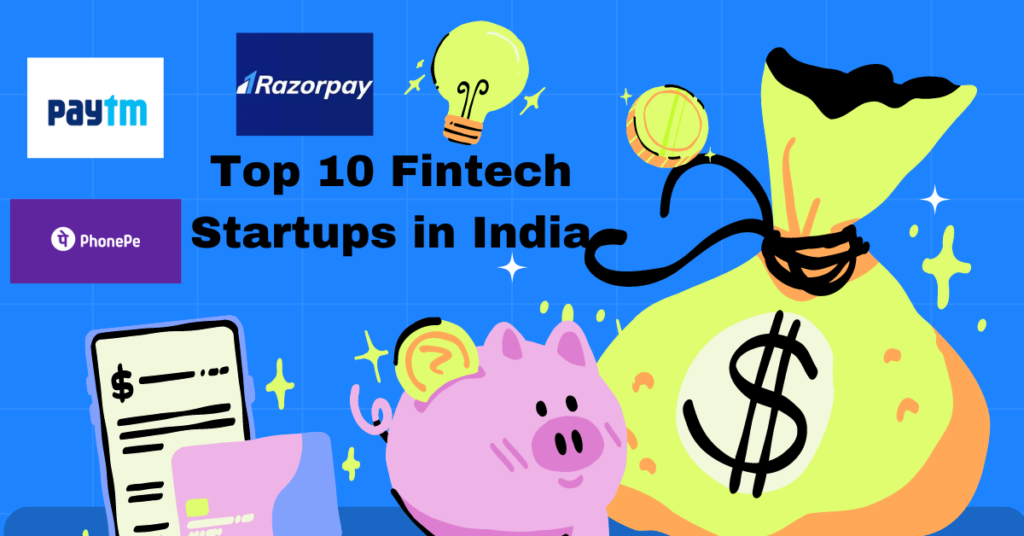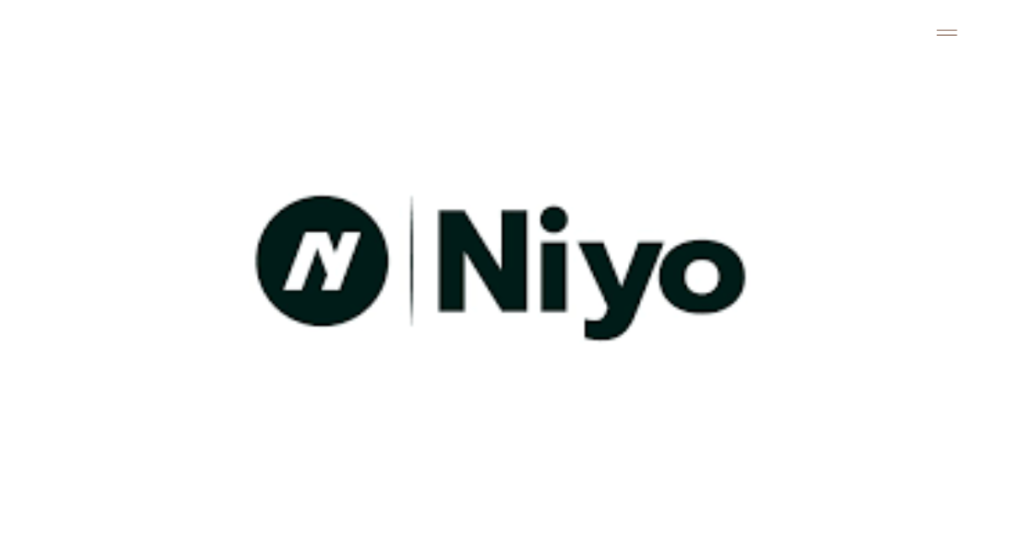Top 10 Fintech Startups in India

Top 10 Fintech Startups in India

Introduction:
Fintech, a portmanteau of “financial technology,” has emerged as a disruptive force in the traditional finance sector. In India, a burgeoning ecosystem of fintech startups is reshaping how financial services are accessed, delivered, and utilized. From digital payments to lending, wealth management to insurance, these startups are leveraging technology to drive financial inclusion and efficiency. Here’s a detailed look at the top 10 fintech startups making waves in India.
1. Paytm

Paytm started as a mobile payments platform and has grown into a comprehensive financial services provider, offering digital wallets, payment gateways, wealth management, and digital banking services, catering to both individuals and businesses.
| Aspect | Details |
| Founded | 2010 |
| Founders | Vijay Shekhar Sharma |
| Headquarters | Uttar Pradesh |
| Key Services | Mobile payments, digital wallet, banking, e-commerce, ticket booking, insurance |
| Notable Achievements | One of the first Indian unicorns, extensive merchant network |
One of India’s most recognizable fintech brands, Paytm started as a mobile payments platform and has evolved into a full-fledged financial services provider. With its digital wallet, payment gateway, and wealth management offerings, Paytm has democratized financial services, especially for the unbanked and underbanked population. Its recent foray into digital banking and merchant services further cements its position as a fintech powerhouse.
Also Read:Top 10 HealthTech Startups in India
2. Razorpay

Razorpay provides payment gateway and neobanking solutions for businesses, offering a range of payment services such as payment links, subscription billing, and instant settlements, with a focus on simplicity, security, and innovation.
| Aspect | Details |
| Founded | 2014 |
| Founders | Harshil Mathur, Shashank Kumar |
| Headquarters | Bengaluru |
| Key Services | Payment gateway, subscription billing, payment links |
| Notable Achievements | Developer-friendly APIs, preferred by startups and SMEs |
Razorpay has emerged as a leading payment gateway and neobanking platform, catering to businesses of all sizes. Its robust suite of payment solutions, including payment links, subscription billing, and instant settlements, has made it a preferred choice for online businesses and startups. Razorpay’s focus on simplicity, security, and innovation has earned it a loyal customer base and significant investor interest.
Also Read:Top 10 Fintech Startups in India
3. PhonePe

PhonePe is a digital payments platform offering services like UPI payments, bill payments, and mutual fund investments, known for its user-friendly interface and seamless integration with popular apps, emphasizing interoperability and partnerships.
| Aspect | Details |
| Founded | 2015 |
| Founders | Sameer Nigam, Rahul Chari, Burzin Engineer |
| Headquarters | Bengaluru |
| Key Services | UPI payments, bill payments, online purchases |
| Notable Achievements | Rapid growth, strong Flipkart integration |
Acquired by Walmart as part of its strategic investment in India, PhonePe is a leading digital payments platform that offers a wide range of services, including UPI payments, bill payments, and mutual fund investments. Its user-friendly interface and seamless integration with popular apps have contributed to its rapid adoption across urban and rural India. PhonePe’s emphasis on interoperability and partnerships has positioned it as a key player in India’s digital payments ecosystem.
Also Read:Top 10 Agritech Startups in India
4. Zerodha

Zerodha is an online discount brokerage platform, offering commission-free trading and innovative tools for traders and investors, with a focus on transparency, education, and customer support.
| Aspect | Details |
| Founded | 2010 |
| Founders | Nithin Kamath, Nikhil Kamath |
| Headquarters | Bengaluru, |
| Key Services | Stock trading, mutual funds, bonds, derivatives |
| Notable Achievements | Revolutionized Indian brokerage industry with low-cost trading |
Zerodha has disrupted India’s brokerage industry with its online discount brokerage platform, offering commission-free trading and innovative tools for traders and investors. Its flagship product, Zerodha Kite, provides a sleek and intuitive trading experience, attracting a growing community of retail investors. Zerodha’s focus on transparency, education, and customer support has made it a trusted name in India’s stock market landscape.
Also Read:Top 10 CleanTech Startups in India
5. Policybazaar

Policybazaar is India’s largest online insurance aggregator, allowing users to compare and purchase various insurance products online, with a technology-driven approach for transparency, convenience, and customer empowerment.
| Aspect | Details |
| Founded | 2008 |
| Founders | Yashish Dahiya, Alok Bansal |
| Headquarters | Gurugram |
| Key Services | Insurance comparison and purchasing platform |
| Notable Achievements | Demystified insurance for millions of Indians |
Policybazaar is India’s largest online insurance aggregator, helping consumers compare and purchase a wide range of insurance products, including health, life, motor, and travel insurance. Its technology-driven approach streamlines the insurance buying process, enabling users to find the best policies at competitive prices. Policybazaar’s emphasis on transparency, convenience, and customer empowerment has propelled its growth and market leadership.
Also Read:Top 10 LegalTech Startups in India
6. Lendingkart

Lendingkart is an AI-driven lending platform providing quick access to credit for small businesses, leveraging alternative data sources and machine learning algorithms to evaluate creditworthiness and offer flexible repayment options
| Startup Name | Lendingkart |
|---|---|
| Industry | Fintech, Online Lending |
| Founded | 2014 |
| Founders | Harshvardhan Lunia, Mukul Sachan |
| Headquarters | Gurugram |
| Key Products | Business Loans, Working Capital Loans |
| Key Features | AI-driven Lending Platform, Quick Disbursement |
| Funding | Over $350 million |
| Investors | Fullerton Financial Holdings, Bertelsmann India Investments, Temasek Holdings |
| Website | lendingkart.com |
Lendingkart is revolutionizing small business lending in India with its AI-driven lending platform that provides quick and hassle-free access to credit. By leveraging alternative data sources and machine learning algorithms, Lendingkart evaluates the creditworthiness of borrowers and disburses loans within hours. Its digital-first approach and flexible repayment options address the financing needs of MSMEs (Micro, Small, and Medium Enterprises), fueling entrepreneurship and economic growth.
Also Read:Top 10 GovTech Startups in India
7. CRED

CRED is a credit card management platform rewarding users for timely bill payments with CRED coins that can be redeemed for exclusive rewards, discounts, and experiences, with a focus on gamification, community-building, and financial literacy.
| Aspect | Details |
| Founded | 2018 |
| Founders | Kunal Shah |
| Headquarters | Bengaluru |
| Key Services | Credit card bill payments, rewards platform |
| Notable Achievements | Gamified approach to credit card management |
CRED is transforming credit card management and rewards redemption with its app-based platform that incentivizes responsible credit behavior. Users earn CRED coins for timely bill payments, which can be redeemed for exclusive rewards, discounts, and experiences. CRED’s focus on gamification, community-building, and financial literacy has garnered a loyal user base and investor confidence, propelling its valuation to unicorn status.
Also Read:Top 10 RetailTech Startups in India
8. Niyo

Niyo offers digital banking solutions for salaried professionals, combining a zero-balance savings account with a Visa-powered debit card and a feature-rich mobile app for budgeting, expense tracking, and personalized insights, focusing on financial wellness and convenience.
| Aspect | Details |
| Founded | 2015 |
| Founders | Vinay Bagri, Virender Bisht |
| Headquarters | Bengaluru |
| Key Services | Digital banking, payroll solutions, NiYO Global Card |
| Notable Achievements | Innovative approach to employee benefits and digital banking |
Niyo is reimagining employee benefits and payroll management with its digital banking solutions for salaried professionals. Its flagship product, NiyoX, combines a zero-balance savings account with a Visa-powered debit card and a feature-rich mobile app that offers budgeting tools, expense tracking, and personalized insights. Niyo’s focus on financial wellness, convenience, and affordability resonates with millennial workers and gig economy participants, driving its adoption in India’s evolving workforce.
Also Read:Top 10 InsurTech Startups in India
9. BharatPe

BharatPe provides QR code-based payment solutions and business finance offerings for small merchants and kirana stores, simplifying payments acceptance and providing access to working capital loans, insurance, and other financial services.
| Startup Name | BharatPe |
|---|---|
| Industry | QR Code Payments, Business Finance |
| Founded | 2018 |
| Founders | Ashneer Grover, Shashvat Nakrani |
| Headquarters | New Delhi |
| Key Products | QR Code Payments, BharatPe QR, Business Loans |
| Key Features | Merchant Payments, Working Capital Loans, Insurance |
| Funding | Over $400 million |
| Investors | Sequoia Capital, Coatue Management, Ribbit Capital |
| Website | bharatpe.com |
BharatPe is empowering small merchants and kirana stores with its QR code-based payment solutions and business finance offerings. Its merchant-first approach simplifies payments acceptance and provides access to working capital loans, insurance, and other financial services. BharatPe’s focus on building trust, fostering entrepreneurship, and driving financial inclusion in tier 2 and tier 3 cities has made it a disruptive force in India’s fintech landscape.
Also Read:Top 10 PropTech Startups in India
10. Upstox

Upstox is a low-cost brokerage platform offering zero brokerage on equity delivery trades, with an intuitive mobile app and web-based trading platform providing access to real-time market data, advanced charting tools, and educational resources, focusing on affordability, transparency, and innovation.
| Startup Name | Upstox |
|---|---|
| Industry | Stock Market, Trading |
| Founded | 2011 |
| Founders | Ravi Kumar, Raghu Kumar, Shrinivas Viswanath |
| Headquarters | Mumbai |
| Key Products | Upstox Pro, Upstox MF, Upstox Learn |
| Key Features | Low-Cost Brokerage, Real-Time Market Data, Advanced Charting Tools |
| Funding | Over $30 million |
| Investors | Tiger Global Management, Kalaari Capital, GVK Davix |
| Website | upstox.com |
Upstox is democratizing stock market investing with its low-cost brokerage platform that offers zero brokerage on equity delivery trades. Its intuitive mobile app and web-based trading platform cater to both seasoned investors and first-time traders, providing access to real-time market data, advanced charting tools, and educational resources. Upstox’s commitment to affordability, transparency, and innovation is empowering retail investors to participate in India’s capital markets like never before.
Also Read:Top 10 FoodTech Startups in India
Frequently Asked Questions (FAQs) about Top 10 fintech startups in India
1. What is a fintech startup?
- A fintech startup is a company that leverages technology to provide innovative financial products or services. These startups often disrupt traditional financial institutions by offering solutions that are more accessible, efficient, and user-friendly.
2. How do fintech startups benefit consumers?
- Fintech startups benefit consumers by providing convenient access to financial services, often at lower costs compared to traditional banks or financial institutions. They also offer innovative solutions that cater to specific needs, such as digital payments, lending, insurance, and investment management.
3. Are fintech startups safe to use?
- Fintech startups prioritize security and compliance to ensure the safety of users’ financial information. They implement robust encryption protocols, identity verification measures, and adhere to regulatory standards to protect against fraud and data breaches. However, users should also exercise caution and follow best practices for online security.
4. How do I choose the right fintech startup for my needs?
- When choosing a fintech startup, consider factors such as the range of services offered, fees and charges, user experience, security measures, customer support, and reputation in the industry. It’s essential to evaluate your specific financial needs and preferences to find a startup that aligns with your requirements.
5. Can fintech startups help with financial inclusion?
- Yes, fintech startups play a crucial role in promoting financial inclusion by providing access to financial services for underserved populations, including the unbanked and underbanked. Their digital solutions eliminate barriers such as geographic limitations, high costs, and complex requirements, making financial services more accessible to a broader segment of the population.
6. How do fintech startups make money?
- Fintech startups generate revenue through various channels, including transaction fees, subscription fees, interest on loans or deposits, commissions on investments, advertising, and partnerships with other financial institutions. They may also offer premium services or value-added features for which users pay a fee.
7. What are the risks associated with fintech startups?
- Risks associated with fintech startups include cybersecurity threats, regulatory compliance issues, operational challenges, market volatility, and competition. Users should be aware of these risks and conduct due diligence before engaging with a fintech startup, including reading terms and conditions, privacy policies, and understanding the risks involved.
8. How are fintech startups regulated?
- Fintech startups are subject to regulatory oversight by government agencies responsible for financial services, such as central banks, securities regulators, and banking authorities. Depending on the nature of their operations and geographic location, fintech startups must comply with regulations related to consumer protection, anti-money laundering, data privacy, and financial stability.
9. Can I trust fintech startups with my financial information?
- Fintech startups prioritize the security and confidentiality of users’ financial information and employ advanced encryption, authentication, and access controls to safeguard data. However, users should exercise caution and only share personal and financial information with reputable and trusted fintech startups that have robust security measures in place.
10. How can I provide feedback or resolve issues with a fintech startup?
- Fintech startups typically offer customer support channels, such as email, phone, live chat, or in-app messaging, for users to provide feedback, seek assistance, or resolve issues. Users can also refer to the startup’s website or app for FAQs, tutorials, and guides on using their services effectively. If necessary, users can escalate unresolved issues to relevant regulatory authorities or consumer protection agencies.
The fintech revolution in India is fueled by innovation, entrepreneurship, and a growing demand for accessible and affordable financial services. The top 10 fintech startups highlighted here are at the forefront of this transformation, leveraging technology to disrupt traditional finance and drive financial inclusion and empowerment across the country. As they continue to innovate and expand their offerings, they are poised to shape the future of finance in India and beyond.
Also Read:
Top 10 HealthTech Startups in India
Top 10 Fintech Startups in India
Top 10 Agritech Startups in India
Top 10 CleanTech Startups in India
Top 10 InsurTech Startups in India
Top 10 LegalTech Startups in India
Top 10 GovTech Startups in India
Top 10 RetailTech Startups in India
Top 10 PropTech Startups in India
Top 10 FoodTech Startups in India
Last Updated on Thursday, June 13, 2024 1:30 pm by Delhi News Wire Team


